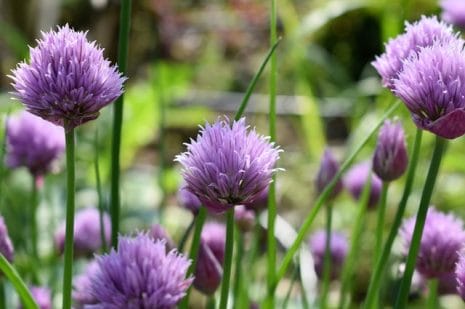Our horticulture tutor, Barbara Tremain, shares why Herbs is her favorite course:
As a professional Horticulturist for 22 years, with a love of plants from childhood, being asked to choose one topic as a particular favourite is a challenge in it’s own right! Having tutored for Careerline Courses since 2012, again my choice of most interesting course has varied. They all shine in their own different ways..as do the students.
Nonetheless, through my personal journey and Careerline career, the one topic that bubbles to the top every time is Herbs. Particular Careerline course Herbs (Introduction), as a thorough basic knowledge and experience deliverer for anyone wishing to develop their skills, privately or commercially.
I grow several herbs at home for use all year round, in a garden with a varied climate – from occasional snow, frost,& cold winds,near the sea, to long damp, mild periods, long hot dry spells, and an insecticide free zone, with acid loamy soil. So, anything in my garden has to be a survivor!!
Mostly my herbs are in pots, some that stay out, and some that go under cover in winter-mainly to prevent them being waterlogged. Amongst these I include mints,chives,basil, lavender, thyme, rosemary,fennel, nasturtium, borage, and the spices ginger and turmeric. They are so versatile, easy to grow for home use, or on a commercial scale.

They have so many uses too – from just smelling nice, or for the cat to play with, to flavouring food, keep ing insects away from skin and clothes, medicinal uses of roots, stems, leaves and essential oils. Generally they are easy and rewarding to grow. Depending on where an individual lives, herbs can be a native plant (mainly in Mediterranean climate zones ), or an exotic. In climates that do not go too far below zero, or for too long,and have warm, dry seasonal periods, in locations with a nutrient balanced free draining soil, herbs can be grown in the soil outdoors.
They have been used and cultivated by many cultures throughout history; Persia, Turkey, Greece,Rome, England, for example. In these and other countries they are also harvested wild, i,e lemongrass in Thailand, Fennel, thyme and lavender in Spain, Lemon Myrtle in Australia.
Commercially, most culinary herbs are a safe bet, and medicinally lavender, mint and chamomile are favoured. Lavender has many uses from a calming room fragrance, to a food flavour, antibacterial and relaxing essential oil,scented candles, soaps,air freshener, clothes moth repellent /wardrobe freshener, bee attractant, garden plant, dried flower arrangements and garlands/wreaths, and so-on.
Most herbs are safe, and unrestricted in growth in most countries. Where regulations lie are when they are processed into medicinal form – i.e aromatherapy oils, teas, tablets, lotions, infusions in alcohol etc. Each country has it’s own laws, and these need to be researched duly, depending on an individual’s or company’s requirements – especially if importing or exporting products.For example, with England leaving the European Union, there may be some deregulation to encourage trade, as the ‘Health Food/Natural Medicine’ area became heavily regulated by The European Union in recent years.
Ancient medicinal systems such as Ayurvedic and Chinese medicine, and alternative gardening methods such as Biodynamic gardening all favour herb usage, produced and combined in such ways that they can be of great interest to and invite further enquiry from the curious.
The Careerline Herbs course, Herbs (Introduction) is a great course to kickstart knowledge and experience with herbs, leading to the potential of further development in many directions. For those wishing to develop industry skills the Herb Culture (Herb farming) course is a good foundation, and for those wishing to specialise, try Growing Lavender Course Online.

